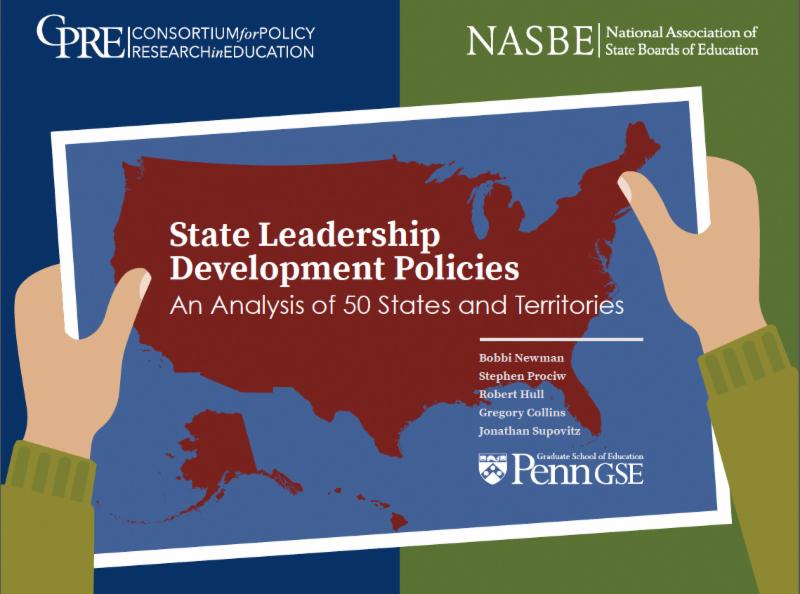The Consortium for Policy Research in Education (CPRE) contributes new, evidence-based knowledge to inform important decisions of education policy and practice.
For more information, please visit: CPRE.org
|
 |

Uniting the Education Community
CPRE Knowledge Hub (CPRE Hub) -
The Consortium for Policy Research in Education is pleased to introduce the CPRE Knowledge Hub, a new way to bring education researchers, policymakers, and practitioners together-
cprehub.org

"The need for the CPRE Knowledge Hub stems from the persistent gulf between practitioners, researchers, and policymakers. All three are working hard to improve the quality of education, but too often in isolation," said CPRE Co-Director Jonathan Supovitz.
Building upon illuminating videos, provocative podcasts, and insightful interviews, the Knowledge Hub provides the conversational space that allows education professionals to interact, reflect, and learn from one another.
The CPRE Knowledge Hub has three central publicly-accessible components. In
Cool Thinking on Hot Topics
, we investigate important and enduring challenges in the education field, bringing together the perspectives of policymakers who design policies to address the challenges, researchers who study the issues, and practitioners who grapple with the consequences. In
Policy Matters
,
we feature short interviews with policymakers on important components of their work to provide insights to their policy, research and practitioner colleagues. In
Research Minutes
, researchers discuss their latest findings on policy-relevant issues. The entire site is supported by
KH Conversations
, an interactive discussion forum designed to facilitate small group engagement and asynchronous comments. The Knowledge Hub also contains
The Commons
, a private and sponsored space, where we bring together national expertise from the different spheres to work with groups to collaborate on specific problems of practice.
Spearheading the initiative is CPRE Knowledge Hub Director Bobbi Newman (University of Pennsylvania). The CPRE Knowledge Hub will be updated on a regular basis with new interviews, podcasts, and an active discussion board. Visitors are encouraged to explore the website and contribute to
KH Conversations
.
|
 New Teachers College CPRE Website New Teachers College CPRE Website
CPRE Teachers College (CPRE-TC) launched its new CPRE website with a refreshed look and a new URL. The new website,
www.tc.columbia.edu/cpre,
features researcher information, projects, publications, and resources.
Teachers College joined the Consortium for Policy Research in Education in 2007, a group dedicated to improving elementary and secondary education through research and development of research-based tools for practitioners. CPRE-TC researchers made their mark studying the effectiveness of federal, state, and local policies, with particular emphasis on accountability systems, school finance, teacher quality initiatives, assessment systems, and school governance. Over time, CPRE-TC's work has shifted from studies of policy implementation to studies of instructional change and effectiveness.
|
 |
 |
 State Leadership Development Policies
-An Analysis of 50 States and Territories
Consortium for Policy Research in Education | January 2017
Prociw
, produced an interactive report that seeks to operationalize the framework developed for state education agencies to improve the school leadership pipeline.
Researchers interviewed state board members and staff members from state education agencies to learn about their states' school leadership development policies and practices. Data collection questions focused on identifying the organizational and individual supports that states have established. State Leadership Development Policies-An Analysis of 50 States and Territories provides a wealth of information for state leaders interested in learning about a sample of each state's policies and programs that support the school leadership pipeline.
|
 |
|
Data Use Practices for Improved
Mathematics Teaching and Learning:
The Importance of Productive Dissonance and Recurring Feedback Cycles
Teachers College Record | December 2016

The experimental study, funded by the Spencer Foundation, involved an intervention designed to support professional learning communities (PLCs) and address limitations in data-use practices by helping teachers connect data on student learning with data on their own instruction. The article highlights the important roles of dissonance and the supports needed to make dissonance productive, including classroom-embedded data that reveals student thinking, tools and processes to support teacher interpretation of data, strong facilitation and attention to group dynamics, and repeated feedback cycles to support continuous improvement over time.
|
 |
 |
|
The Future of Teacher Evaluation
Matthew P. Steinberg
 A growing body of evidence suggests that recent teacher evaluation reforms have improved teaching and learning and helped identify and remove the lowest-performing teachers. In this
article, Matthew Steinberg explains how the additional autonomy provided under ESSA, state and district administrators can further enhance their teacher evaluation systems-and tailor those systems to their schools' and districts' unique needs, values, and capacities.
|
 |
National Reading Recovery
&
K-6 Literacy Conference | #nccbus
January 2017
 CPRE Senior Researcher Abby Gray presented her findings from report
Reading Recovery: An Evaluation of the Four-Year i3 Scale-Up.
This report is an evaluation of one of the most ambitious and well-documented expansions of a U.S. instructional curriculum. The rigorous independent evaluation of the Investing in Innovation (i3) scale-up of Reading Recovery, a literacy intervention for struggling first graders, was a collaboration between CPRE and the Center for Research on Education and Social Policy (CRESP) at the University of Delaware.
CPRE Senior Researcher Abby Gray presented her findings from report
Reading Recovery: An Evaluation of the Four-Year i3 Scale-Up.
This report is an evaluation of one of the most ambitious and well-documented expansions of a U.S. instructional curriculum. The rigorous independent evaluation of the Investing in Innovation (i3) scale-up of Reading Recovery, a literacy intervention for struggling first graders, was a collaboration between CPRE and the Center for Research on Education and Social Policy (CRESP) at the University of Delaware.
|
In Practice-
Influential CPRE Research in the News
|
|
Jonathan Supovitz
The limited use of research in education policymaking is a longstanding challenge for those who advocate the best possible decision-making by education leaders. The gap between researchers and policymakers, the so-called "two communities problem," is well known: researchers and policymakers live in separate worlds, with different reward systems and problem-solution time frames, speak different languages, and seek the answers to different questions.
|
 |
 |
 |
K-3 Policymakers' Guide to Action
 Education Commission of the States partnered with CPRE Knowledge Hub to provide viewers with context regarding their new report, K-3 Policymakers' Guide to Action: Making the early years count. The Cool Thinking on Hot Topics series on the K-3 Policymakers' Guide to Action kicks off a conversation with Bruce Atchison, Director of Early Learning at the Education Commission of the States. Atchison explains how Education Commission of the States realized a significant disconnect between pre-kindergarten and K-12 policy and therefore sought to draw policymakers attention to improving the quality of K-3, leading to the development of the K-3 Policymakers' Guide to Action. Education Commission of the States partnered with CPRE Knowledge Hub to provide viewers with context regarding their new report, K-3 Policymakers' Guide to Action: Making the early years count. The Cool Thinking on Hot Topics series on the K-3 Policymakers' Guide to Action kicks off a conversation with Bruce Atchison, Director of Early Learning at the Education Commission of the States. Atchison explains how Education Commission of the States realized a significant disconnect between pre-kindergarten and K-12 policy and therefore sought to draw policymakers attention to improving the quality of K-3, leading to the development of the K-3 Policymakers' Guide to Action.
|
|
|
|
Consortium for Policy Research in Education (CPRE) brings together education experts from renowned research institutions to contribute new knowledge that informs PK-20 education policy and practice. Our work is peer-reviewed and open-access.
CPRE Institutions:
|
|
|